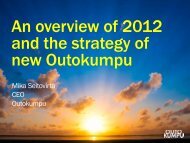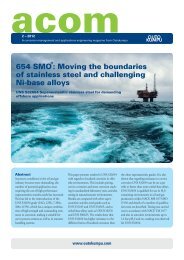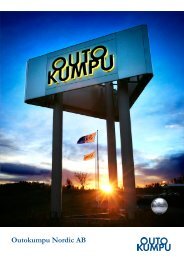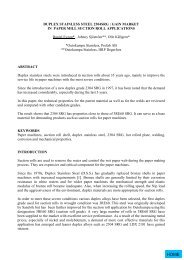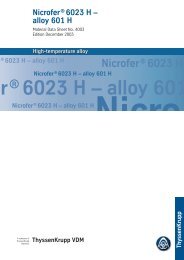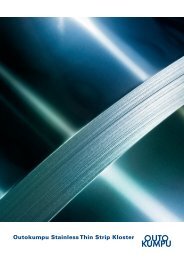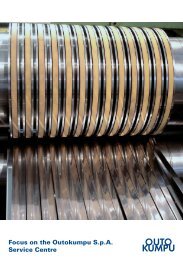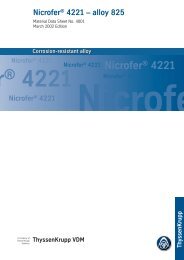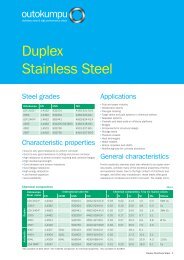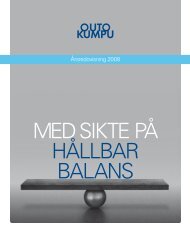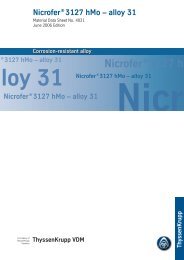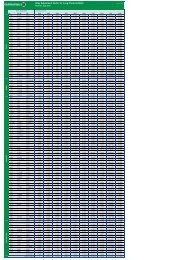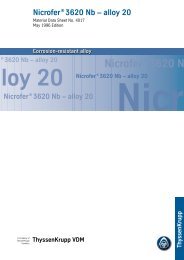Annual Report 2010 - Outokumpu
Annual Report 2010 - Outokumpu
Annual Report 2010 - Outokumpu
Create successful ePaper yourself
Turn your PDF publications into a flip-book with our unique Google optimized e-Paper software.
202<br />
The strengthening of the Swedish krona during <strong>2010</strong> had a somewhat negative impact on the Group's earnings and<br />
gearing. Nickel and molybdenum prices rose during <strong>2010</strong> and increased working capital significantly, consequently<br />
having a negative impact on gearing. Actions aimed at maintaining financial flexibility – such as the enhanced<br />
management of inventory levels – were given priority.<br />
The availability of insured credit limits improved, and <strong>Outokumpu</strong>'s exposure to customer credit risks was reduced.<br />
Improvements in the rate of overdue receivables were also achieved during <strong>2010</strong>.<br />
Liquidity and refinancing risks are taken into account in capital management decisions and, when necessary, in making<br />
investment and other business decisions. In <strong>2010</strong>, <strong>Outokumpu</strong> issued a EUR 250 million bond. At the end of the year the<br />
Group's EUR 900 million syndicated credit facility was fully undrawn. <strong>Outokumpu</strong> seeks to avoid having financial<br />
covenants in its debt. Despite of this principle, the Revolving Credit Facility and some other loans include a financial<br />
covenant, which is tied to gearing. The definition of the covenant gearing differs to some degree from the definition of the<br />
reported gearing. The difference between the covenant maximum and actual gearing decreased during the year but<br />
there was still a decent gap between these at the end of the year.<br />
During <strong>2010</strong>, <strong>Outokumpu</strong> took action to hedge part of the forecasted cash flows related to business operations in<br />
Sweden and also continued nickel risk hedging to reduce the impacts of nickel price changes on earnings. <strong>Outokumpu</strong><br />
also adjusted its interest rate position by deciding to leave the EUR 250 million bond fixed interest rate-based.<br />
Civil actions regarding <strong>Outokumpu</strong>'s divested fabricated copper products<br />
business<br />
Since 2004, <strong>Outokumpu</strong> has been in the process of addressing several civil complaints, including class actions, raised in<br />
the US against the company and its former fabricated copper products business in the US. The last remaining class<br />
action was one brought in the federal court of Tennessee on behalf of certain indirect purchasers of industrial copper<br />
tubing. <strong>Outokumpu</strong> considered the allegations in the proceedings to lack merit, but settled with the claimants in August<br />
<strong>2010</strong> by paying a nominal sum. The action was subsequently dismissed by a federal judge.<br />
A pending civil complaint in the US, an individual action filed in 2006 in the federal district court in Memphis, Tennessee,<br />
seeks an unstated amount of damages in connection with an alleged world-wide price-fixing and market-allocation cartel.<br />
The court dismissed this complaint in 2007, and an appeal against that dismissal is currently pending.<br />
In <strong>2010</strong>, a civil action was brought in the UK courts against <strong>Outokumpu</strong> (and two other defendant groups) by the same<br />
claimant group as that in the Memphis suit. The claimants allege that they suffered loss across Europe as a result of the<br />
cartel and are seeking recovery from the three main defendant groups either jointly or jointly and severally. The<br />
claimants' initial claim for alleged losses (between the three defendant groups) is some GBP 20 million excluding<br />
interest. <strong>Outokumpu</strong> will be challenging the jurisdiction of the UK courts to hear this claim. In any event, <strong>Outokumpu</strong><br />
believes that the allegations regarding damages caused by the cartel are groundless and, if pursued, <strong>Outokumpu</strong> will<br />
defend itself in any proceedings.<br />
No provisions have been booked in connection with these claims.<br />
Customs investigation of Tornio Work's exports to Russia<br />
In March 2007, Finnish Customs authorities initiated a criminal investigation into the Group's Tornio Works' export<br />
practices to Russia. It was suspected that a forwarding agency based in south-eastern Finland had prepared defective<br />
and/or forged invoices regarding the export of stainless steel to Russia. The preliminary investigation focused on<br />
possible complicity by <strong>Outokumpu</strong> Tornio Works in the preparation of defective and/or forged invoices by the forwarding<br />
agent. In June 2009, the Finnish Customs completed its preliminary investigation and forwarded the matter for<br />
consideration of possible charges to the prosecution authorities. The process of considering possible charges was<br />
<strong>Outokumpu</strong> <strong>Annual</strong> <strong>Report</strong> <strong>2010</strong> – Financial Statements – Review by the Board of Directors for <strong>2010</strong>



